5 Essential Schema Plugins for WordPress
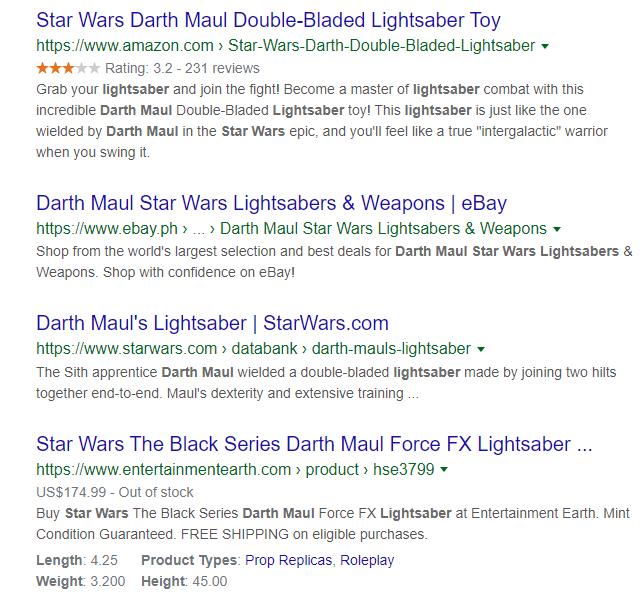
Not all website elements are created equal.
Some matter – and some matter a ton.
So what are your site’s standout elements? Here are five:
- Customer reviews.
- Ratings.
- Product pricing.
- Recipe ingredients (if your website is about cooking).
- Your company’s operating hours.
It’s pretty obvious to you how important these elements are to your site.
But how can you make search engines understand that?
The answer is with schema markup and rich snippets.
What Are Schema Markup & Rich Snippets?
Rich snippets are the extra pieces of information that appear around your website’s link.
Schema markup is HTML code used to create rich snippets.
Take a look at this example.
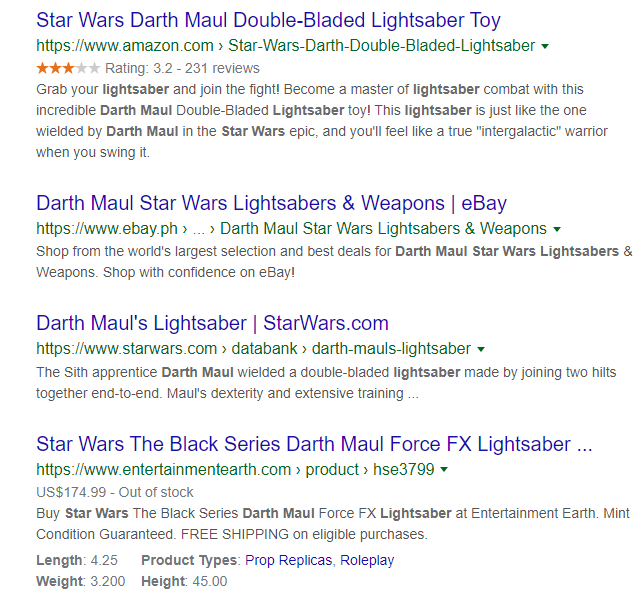
Let’s say you want to buy a Darth Maul toy lightsaber.
You go on Google and type “Star Wars Darth Maul Lightsaber.”
The photo above shows you the results.
As you can see, you don’t only get links to the different websites selling the toy.
You also get a bunch of additional information to help you decide which link to click.
Amazon shows you star ratings and reviews.
Entertainment Earth includes the toy’s price, length, height, and weight.
Valuable pieces of information, right?
These are your rich snippets.
And if you add them to your site, you’ll naturally boost it higher on Google’s SERPs.
How Rich Snippets Boost Your SEO Ranking
Technically, rich snippets don’t directly affect your site’s ranking on Google’s SERPs.
However, they can still get you ranked higher on Google.
For instance, let’s say you want to bake a Black Forest cake for a loved one’s birthday.
You go on Google and type “Black Forest Cake Recipe.”
Here are the results you get:
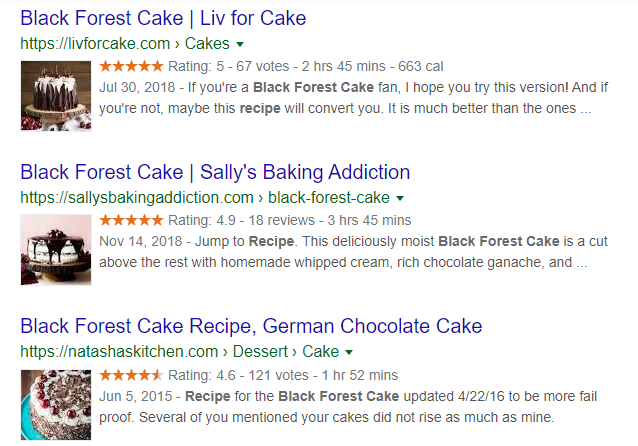
As a busy cake-lover, which recipe would you most likely click? One that is rated 5 stars and takes 2 hours and 45 minutes to bake? Or one that is rated 4.9 stars and takes 3 hours and 45 minutes to bake?
Naturally, you’d choose the first option.
The star rating, votes, and description (all rich snippets) encourage you to go to livforcake.com for your recipe.
This is how your rich snippets increase your click-through rate.
And the higher your click-through rate, the more likely Google will notice you.
So how do you add rich snippets to your site?
The Top 5 Schema Plugins for WordPress
The great news is if you’re using WordPress, you don’t have to touch a single line of code.
Simply choose a schema plugin, and creating rich snippets will be easy.
Here are the top five marketers love.
1. Schema Pro
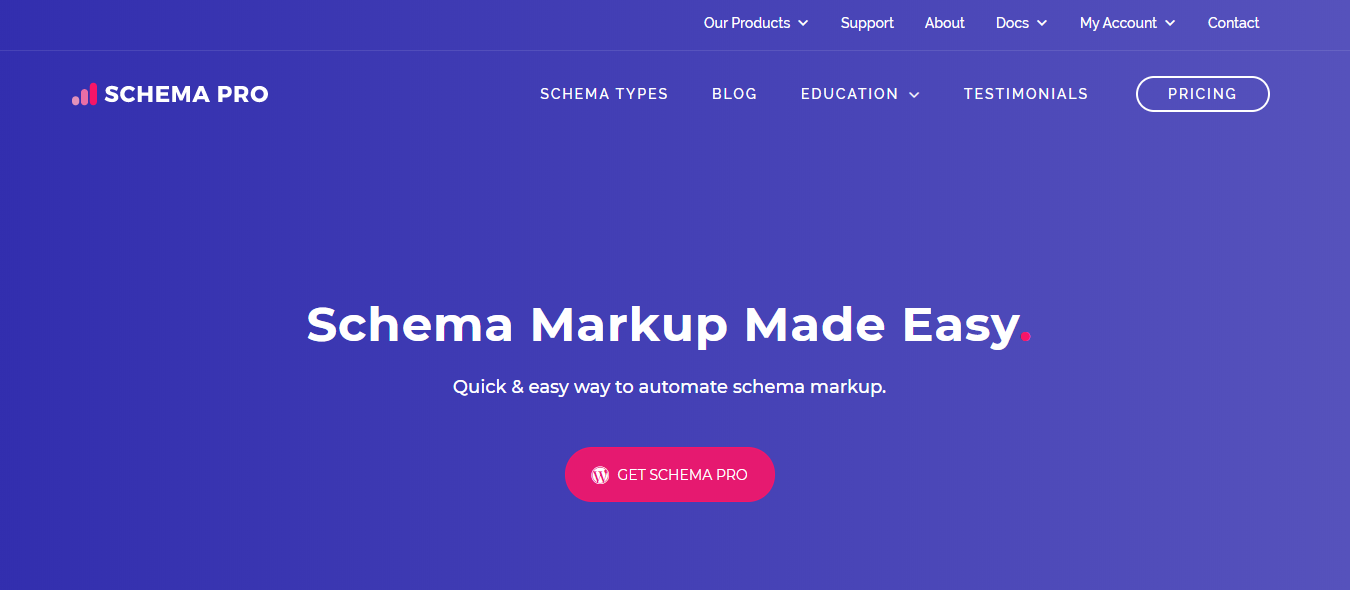
Schema Pro makes adding rich snippets to your site fast and easy.
In a matter of minutes, you can add your preferred configurations to all your pages and posts.
Schema Pro supports 13 useful schema types. These are:
- Reviews (music, movies, products, books, etc.).
- Services.
- Recipes (you can create your own attractive schema rich card that’ll boost your click-through rate).
- Software applications (add reviews and star ratings to give your applications a boost).
- Video objects.
- Books.
- People.
- Products (give searchers detailed information on what you’re selling).
- Local businesses.
- Articles (news, blogs, etc.).
- Courses.
- Job postings.
- Events.
Price: $79/month or $249/lifetime
2. All in One Schema Rich Snippets
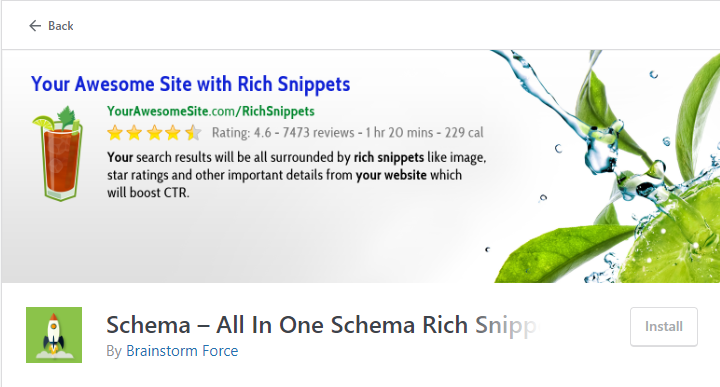
All in One Schema Rich Snippets is one of the simplest plugins you can find for schema markup.
Although it’s simple, it provides you with snippets for reviews, ratings, events, articles, and software applications.
One great thing about this plugin is you can use it for free.
It doesn’t have a ton of fancy designs to select from, but it does have the basics you need for rich snippets on your site.
The downside of using this plugin is it doesn’t support automation.
You’ll have to add schema markup to each page of your site manually.
What’s interesting about All in One Schema Rich Snippets is it’s made by the same maker as Schema Pro.
In fact, its dashboard heavily advertises Schema Pro.
So how to choose between the two?
Use Schema Pro if you’re running a bigger online business.
The price will be worth it for the automation, unique designs, and schema markup support for local businesses.
If you’re just starting out and want to try something for free?
Go with All in One Schema Rich Snippets.
Price: Free
3. Schema and Structured Data for WP & AMP
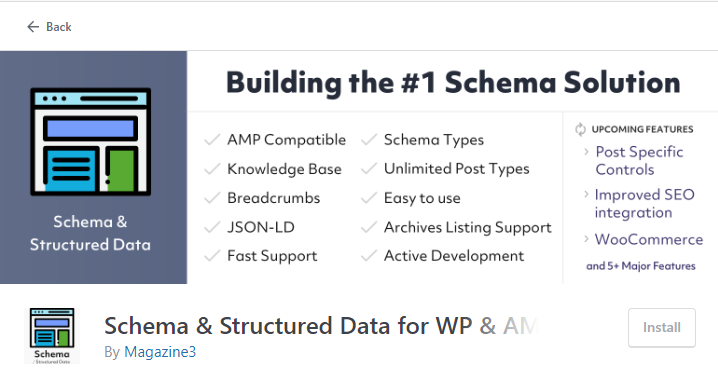
Schema and Structured Data for WP & AMP supports 33 schema types.
Three unique ones include:
- How To (list the steps in your how-to article to be featured in your rich snippets)
- Q&A (if your article is in a question and answer format, you can feature the most relevant questions and answers in your rich snippets)
- Audio object (add details about audio you upload like date of upload, length, etc. to your rich snippets)
The best part? If the schema type you’re looking for isn’t part of the 33 this plugin offers, you can request a customized type!
Here are other features this plugin offers:
- Reviews pulled from over 75 sites.
- Your own customized review rating boxes with schema markup.
- Compatibility with other schema plugins like SEO Pressor and WP SEO Schema.
Price: Personal: $99, Webmaster: $149, Freelancer: $299, Agency: $499
4. WP Review Plugin
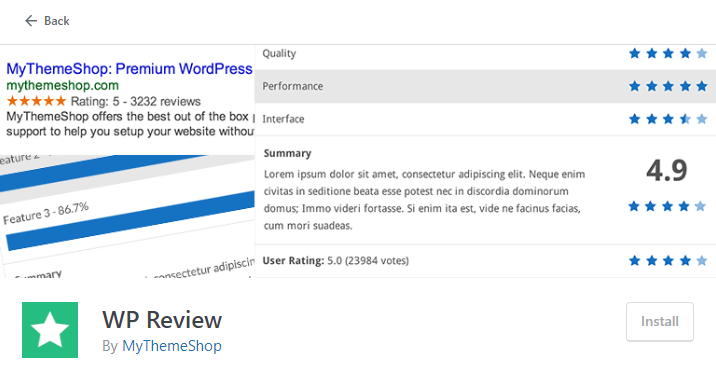
If you run an ecommerce site, WP Review is a good plugin option for you.
This is because its main focus is increasing your consumer interaction with product and service ratings and reviews.
If you’re a blogger, this plugin is also great because you can use it to rank and rate tools, software, recipes, or anything else you review.
Here are the top features you’ll get with WP Review:
- Rating systems using points, percentage, or stars.
- Unlimited color changes for individual reviews.
- Lightweight, won’t slow your site down.
- Supported by most WordPress themes (both free and paid).
- 2 templates for review boxes to choose from.
WP review is easy to install and configure, making schema markup simple for the least tech-savvy person.
Price: Personal (one site): $49/year or $236/lifetime, Developer (more than one site): $149/year or $596/lifetime, Agency (affiliate marketer): $299/year or $1,196/lifetime.
5. WP SEO Structured Data Schema

WP SEO Structured Data Schema is a free plugin that contains all the basics you need for schema markup and rich snippets.
It supports schema types including organizations, local businesses, videos, events, and ratings.
You can also add geo coordinates, people’s names, logos, business descriptions, working hours, and more.
Price: Free
How to Find the Schema Plugin for WordPress That Fits You
Schema markup and rich snippets are essential to your site SEO.
They make your site look attractive.
They encourage people to click your link.
They help you stand out in the sea of other websites.
So how can you choose the one that’s right for you?
It’s simple.
All you must do is determine your needs.
Do you have a simple site that doesn’t require detailed rich snippets? Go for a free, user-friendly plugin.
Are you an affiliate marketer with five websites and blogs? An investment in a plugin with the latest features will be worthwhile.
As soon as you’ve chosen and installed the right plugin, you’re ready to use a powerful tool that’ll make your click-through rate soar.
More Resources:
Image Credits
All screenshots taken by author, December 2019
AI
Exploring the Evolution of Language Translation: A Comparative Analysis of AI Chatbots and Google Translate

According to an article on PCMag, while Google Translate makes translating sentences into over 100 languages easy, regular users acknowledge that there’s still room for improvement.
In theory, large language models (LLMs) such as ChatGPT are expected to bring about a new era in language translation. These models consume vast amounts of text-based training data and real-time feedback from users worldwide, enabling them to quickly learn to generate coherent, human-like sentences in a wide range of languages.
However, despite the anticipation that ChatGPT would revolutionize translation, previous experiences have shown that such expectations are often inaccurate, posing challenges for translation accuracy. To put these claims to the test, PCMag conducted a blind test, asking fluent speakers of eight non-English languages to evaluate the translation results from various AI services.
The test compared ChatGPT (both the free and paid versions) to Google Translate, as well as to other competing chatbots such as Microsoft Copilot and Google Gemini. The evaluation involved comparing the translation quality for two test paragraphs across different languages, including Polish, French, Korean, Spanish, Arabic, Tagalog, and Amharic.
In the first test conducted in June 2023, participants consistently favored AI chatbots over Google Translate. ChatGPT, Google Bard (now Gemini), and Microsoft Bing outperformed Google Translate, with ChatGPT receiving the highest praise. ChatGPT demonstrated superior performance in converting colloquialisms, while Google Translate often provided literal translations that lacked cultural nuance.
For instance, ChatGPT accurately translated colloquial expressions like “blow off steam,” whereas Google Translate produced more literal translations that failed to resonate across cultures. Participants appreciated ChatGPT’s ability to maintain consistent levels of formality and its consideration of gender options in translations.
The success of AI chatbots like ChatGPT can be attributed to reinforcement learning with human feedback (RLHF), which allows these models to learn from human preferences and produce culturally appropriate translations, particularly for non-native speakers. However, it’s essential to note that while AI chatbots outperformed Google Translate, they still had limitations and occasional inaccuracies.
In a subsequent test, PCMag evaluated different versions of ChatGPT, including the free and paid versions, as well as language-specific AI agents from OpenAI’s GPTStore. The paid version of ChatGPT, known as ChatGPT Plus, consistently delivered the best translations across various languages. However, Google Translate also showed improvement, performing surprisingly well compared to previous tests.
Overall, while ChatGPT Plus emerged as the preferred choice for translation, Google Translate demonstrated notable improvement, challenging the notion that AI chatbots are always superior to traditional translation tools.
Source: https://www.pcmag.com/articles/google-translate-vs-chatgpt-which-is-the-best-language-translator
Google Implements Stricter Guidelines for Mass Email Senders to Gmail Users

Beginning in April, Gmail senders bombarding users with unwanted mass emails will encounter a surge in message rejections unless they comply with the freshly minted Gmail email sender protocols, Google cautions.
Fresh Guidelines for Dispatching Mass Emails to Gmail Inboxes In an elucidative piece featured on Forbes, it was highlighted that novel regulations are being ushered in to shield Gmail users from the deluge of unsolicited mass emails. Initially, there were reports surfacing about certain marketers receiving error notifications pertaining to messages dispatched to Gmail accounts. Nonetheless, a Google representative clarified that these specific errors, denoted as 550-5.7.56, weren’t novel but rather stemmed from existing authentication prerequisites.
Moreover, Google has verified that commencing from April, they will initiate “the rejection of a portion of non-compliant email traffic, progressively escalating the rejection rate over time.” Google elaborates that, for instance, if 75% of the traffic adheres to the new email sender authentication criteria, then a portion of the remaining non-conforming 25% will face rejection. The exact proportion remains undisclosed. Google does assert that the implementation of the new regulations will be executed in a “step-by-step fashion.”
This cautious and methodical strategy seems to have already kicked off, with transient errors affecting a “fraction of their non-compliant email traffic” coming into play this month. Additionally, Google stipulates that bulk senders will be granted until June 1 to integrate “one-click unsubscribe” in all commercial or promotional correspondence.
Exclusively Personal Gmail Accounts Subject to Rejection These alterations exclusively affect bulk emails dispatched to personal Gmail accounts. Entities sending out mass emails, specifically those transmitting a minimum of 5,000 messages daily to Gmail accounts, will be mandated to authenticate outgoing emails and “refrain from dispatching unsolicited emails.” The 5,000 message threshold is tabulated based on emails transmitted from the same principal domain, irrespective of the employment of subdomains. Once the threshold is met, the domain is categorized as a permanent bulk sender.
These guidelines do not extend to communications directed at Google Workspace accounts, although all senders, including those utilizing Google Workspace, are required to adhere to the updated criteria.
Augmented Security and Enhanced Oversight for Gmail Users A Google spokesperson emphasized that these requisites are being rolled out to “fortify sender-side security and augment user control over inbox contents even further.” For the recipient, this translates to heightened trust in the authenticity of the email sender, thus mitigating the risk of falling prey to phishing attempts, a tactic frequently exploited by malevolent entities capitalizing on authentication vulnerabilities. “If anything,” the spokesperson concludes, “meeting these stipulations should facilitate senders in reaching their intended recipients more efficiently, with reduced risks of spoofing and hijacking by malicious actors.”
Google’s Next-Gen AI Chatbot, Gemini, Faces Delays: What to Expect When It Finally Launches

In an unexpected turn of events, Google has chosen to postpone the much-anticipated debut of its revolutionary generative AI model, Gemini. Initially poised to make waves this week, the unveiling has now been rescheduled for early next year, specifically in January.
Gemini is set to redefine the landscape of conversational AI, representing Google’s most potent endeavor in this domain to date. Positioned as a multimodal AI chatbot, Gemini boasts the capability to process diverse data types. This includes a unique proficiency in comprehending and generating text, images, and various content formats, even going so far as to create an entire website based on a combination of sketches and written descriptions.
Originally, Google had planned an elaborate series of launch events spanning California, New York, and Washington. Regrettably, these events have been canceled due to concerns about Gemini’s responsiveness to non-English prompts. According to anonymous sources cited by The Information, Google’s Chief Executive, Sundar Pichai, personally decided to postpone the launch, acknowledging the importance of global support as a key feature of Gemini’s capabilities.
Gemini is expected to surpass the renowned ChatGPT, powered by OpenAI’s GPT-4 model, and preliminary private tests have shown promising results. Fueled by significantly enhanced computing power, Gemini has outperformed GPT-4, particularly in FLOPS (Floating Point Operations Per Second), owing to its access to a multitude of high-end AI accelerators through the Google Cloud platform.
SemiAnalysis, a research firm affiliated with Substack Inc., expressed in an August blog post that Gemini appears poised to “blow OpenAI’s model out of the water.” The extensive compute power at Google’s disposal has evidently contributed to Gemini’s superior performance.
Google’s Vice President and Manager of Bard and Google Assistant, Sissie Hsiao, offered insights into Gemini’s capabilities, citing examples like generating novel images in response to specific requests, such as illustrating the steps to ice a three-layer cake.
While Google’s current generative AI offering, Bard, has showcased noteworthy accomplishments, it has struggled to achieve the same level of consumer awareness as ChatGPT. Gemini, with its unparalleled capabilities, is expected to be a game-changer, demonstrating impressive multimodal functionalities never seen before.
During the initial announcement at Google’s I/O developer conference in May, the company emphasized Gemini’s multimodal prowess and its developer-friendly nature. An application programming interface (API) is under development, allowing developers to seamlessly integrate Gemini into third-party applications.
As the world awaits the delayed unveiling of Gemini, the stakes are high, with Google aiming to revolutionize the AI landscape and solidify its position as a leader in generative artificial intelligence. The postponed launch only adds to the anticipation surrounding Gemini’s eventual debut in the coming year.
-

 SEARCHENGINES7 days ago
SEARCHENGINES7 days agoGoogle Core Update Volatility, Helpful Content Update Gone, Dangerous Google Search Results & Google Ads Confusion
-

 SEO7 days ago
SEO7 days ago10 Paid Search & PPC Planning Best Practices
-

 MARKETING5 days ago
MARKETING5 days ago5 Psychological Tactics to Write Better Emails
-

 SEARCHENGINES6 days ago
SEARCHENGINES6 days agoWeekend Google Core Ranking Volatility
-

 MARKETING6 days ago
MARKETING6 days agoThe power of program management in martech
-

 SEO6 days ago
SEO6 days agoWordPress Releases A Performance Plugin For “Near-Instant Load Times”
-

 PPC5 days ago
PPC5 days ago20 Neuromarketing Techniques & Triggers for Better-Converting Copy
-
SEARCHENGINES5 days ago
Daily Search Forum Recap: April 15, 2024















